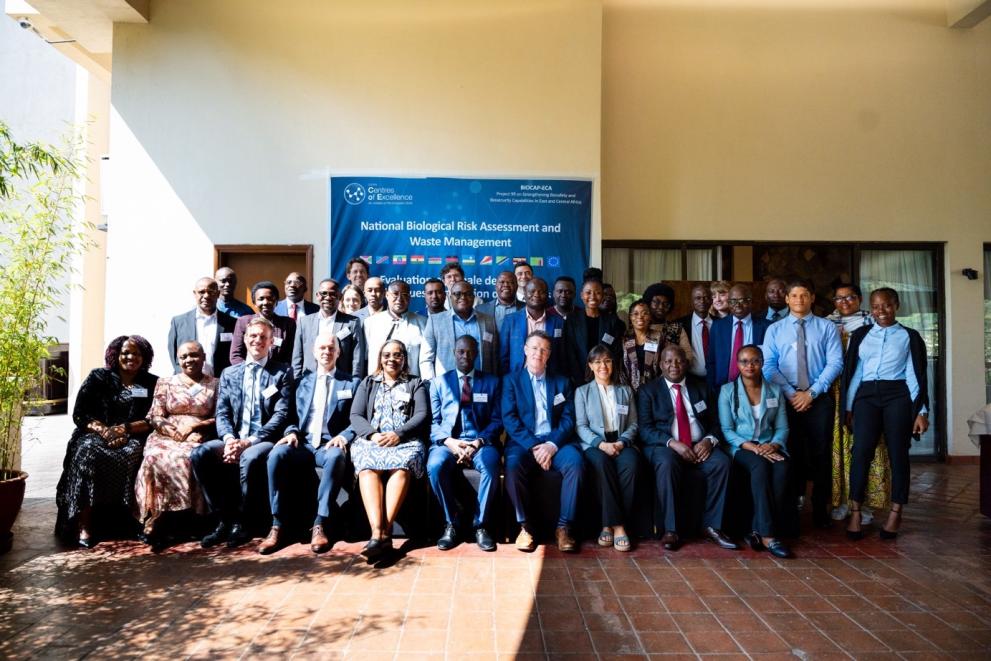
Ensuring countries are prepared to respond to biological threats is ever-so needed in today’s globalised world. The inadequate control over biological materials poses grave threats to public health and the environment, which go far beyond national borders.
The development of national biological risk assesstment tools can help countries ensure not only theirs but also their neighbours’ safe and secure environment.
Enhancing Africa’s readiness to address risks caused by biological materials and installations
As part of its mission to advance CBRN risk mitigation and strengthen security and safety worldwide, the European Union has supported a pivotal regional workshop in Nairobi, Kenya, with the aim of enhancing 11 African countries’ readiness to handle and face the risks caused by biological materials and installations.
The five-day event (10 – 14 June 2024) gathered 50 experts from 11 Eastern and Central African countries to develop their own national biological risk assessment tool. The workshop was organised under the auspices of BIOCAP-ECA or P99 project of the European Union Chemical, Biological, Radiological, and Nuclear Risk Mitigation Centres of Excellence Initiative EU CBRN CoE
“Today, we gather in Nairobi to further advance our collective efforts in strengthening biosafety and biosecurity capabilities within the East and Central African region.”
Henriette Geiger, Ambassador, EU Delegation to Kenya
“This workshop holds significance as we strive to enhance our understanding and preparedness in the face of biological risks, while also addressing the critical issue of biological waste management – a domain where many partner countries face infrastructural, legal, and resource constraints”, said Henriette Geiger, Ambassador, EU Delegation to Kenya.
This workshop centered on the newly developed National Biological Risk Assessment (NBRA) tool targeted at the partner countries of Burundi, the Democratic Republic of Congo, Ethiopia, Ghana, Kenya, Malawi, Rwanda, Seychelles, Tanzania, Uganda, and Zambia. All partner countries are members of the EU CBRN CoE Regional Secretariat for Eastern and Central Africa
It follows a collaborative workshop held in Addis Ababa last year, where the BIOCAP-ECA experts gathered the views and needs of the participating nations’ experts. They have since worked on crafting a tool tailored to the various realities of the Central and East African region’s partners when it comes to risk evaluation, risk prioritisation, risk overview and scenario templates.
Putting safety first: a tailored tool for each country
Over the course of five days, countries’ experts got to hear a panel of presentations from several international speakers from the Food and Agriculture Organization (FAO), the Africa Centres for Disease Control and Prevention (CDC) and the World Health Organization (WHO), as well as BIOCAP-ECA experts. They were then involved in hands-on exercises to ensure adequate in-country application of the NBRA tool.
‘By the end of the workshop, participants should have a comprehensive overview of the reports, documentation, and expertise required to perform an NBRA, thereby enabling them to initiate the implementation process,’ explained Scott Spence, Team Leader of BIOCAP-ECA, noting that this process will start with Kenya and Seychelles in November 2024, with other partner countries following in 2025.
“Kenya is pleased to host this regional workshop as it gives us an opportunity to further our agenda on issues of biosecurity. Currently we have a legislation that addresses partially biosafety issues, but, for biosecurity issues, it is still a challenge. [Kenya] is working on a draft law that will address those issues,” explained William Munyoki, BIOCAP-ECA’s Focal Point for Kenya, highlighting the importance of the workshop to “learn more about the NBRA tool and make use of it in order to take decisions on biological materials in a way that has never been done comprehensively."
The workshop also covered the high-risk biological agents facilities’ mapping and biological waste management principles.
"When talking about risk assessment, ultimately we are really thinking about national security.”
Musonda Mandona, national expert from Zambia
“I am hoping that BIOCAP-ECA’s capacity training, which includes the conduction of country-level risk assessments, will ultimately have an impact on the way we are trying to responsibly and safely use science for diagnosis, research and other areas,” stressed Musonda Mandona, national expert from Zambia.
Strengthening biosafety and biosecurity capabilities in Eastern and Central Africa
Established in the context of the EU CBRN CoE Initiative, Project BIOCAP-ECA aims to support 11 countries of Eastern and Central Africa to enhance the detection and mitigation of risks associated with CBRN materials or agents, as well as risks linked to installations or sites. The participating countries are Burundi, the Democratic Republic of Congo, Ethiopia, Ghana, Kenya, Malawi, Rwanda, Seychelles, Tanzania, Uganda, and Zambia.
Scheduled to run until June 2026, BIOCAP-ECA encompasses various activities including national legislation review, gap identification, awareness raising on biosafety and biosecurity, risk assessments, contingency and response plans, and waste management.
“The EU is resolutely committed to promoting international cooperation and capacity-building efforts to mitigate risks associated with CBRN materials across the African continent. We are hopeful that this project will deliver tangible results, contributing to the establishment of effective safeguards in areas considered to be high-risk, and ultimately strengthening Eastern and Central Africa’s regional resilience against biological threats.”
Henriette Geiger, Ambassador, EU Delegation to Kenya.
BIOCAP-ECA is implemented by a consortium led by Expertise France, and comprised of Liège University, RIVM, SCJS Europe and ISEM Institute. To learn more about the project, please visit the CoE Project 99
To learn more about how the EU CBRN CoE is supporting strengthening CBRN risk mitigation in Eastern and Central Africa, please visit the ECA Regional Secretariat page
Details
- Publication date
- 21 June 2024
- Authors
- Service for Foreign Policy Instruments | Joint Research Centre
- CBRN areas
- Bio-safety/bio-security
- Legal framework
- Protection of material/facilities
- Public and infrastructure protection
- Public health impact mitigation
- Safety and security
- Waste management
- CBRN categories
- Biological
- CoE Region
- ECA - Eastern and Central Africa
